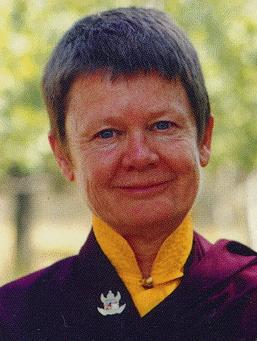Books |
Pema Chodron: When Things Fall Apart: Heart Advice for Difficult Times
By
Published: Nov 22, 2021
Category:
Spirituality
Deirdre Blomfield-Brown went to the posh Miss Porter’s School and graduated from the University of California at Berkeley. She married, moved to New Mexico, became a teacher, had two children. Nothing spectacular occurred to her — until the day in 1972 when her husband announced that he was having an affair and wanted a divorce.
As so often happens in that moment, her life “fell apart.”
“I couldn’t feel any ground under my feet,” she recalls. “It was devastating.”
One day, in a friend’s pickup truck, Blomfield-Brown saw a magazine that lay open to an article by Chögyam Trungpa. The title: “Working with Negativity.” The first line: “There’s nothing wrong with negativity.”
Blomfeld-Brown, then 36 years old, took this to mean: “There’s nothing wrong with what you’re going through. It’s very real, and it brings you closer to the truth.” It was, she says, “the first sane advice I had heard for someone in my situation. As I read, I kept nodding and saying to myself: ‘This is true.’ I didn’t even know that Chögyam Trungpa was a Buddhist teacher, or that it was Buddhism I was reading about.”
Four years later, Deirdre Blomfield-Brown had taken Chogyam Trungpa Rinpoche as her teacher and was an ordained Buddhist monk: Pema Chodron. In 1984, she would become head of the Gampo Abbey in Nova Scotia. Now this grandmother of three is the best-known American — man or woman — writer on Tibetan Buddhism.
But that’s too limiting.
Pema Chodron may be a Buddhist scholar, but she doesn’t talk or write like one. In “When Things Fall Apart: Heart Advice for Difficult Times,” she rarely uses technical terms. She comes across like your smart, no bullshit next-door neighbor. [To buy the paperback from Amazon, click here. For the Kindle edition, click here.]
And she pierces all your armor.
We don’t get, she says, that fear is our friend. Or that it’s “a natural reaction to moving closer to the truth.” Instead, “we freak out when there’s even the merest hint of fear.” Which only makes our situation worse. And then everything falls apart — “we run out of options for escape.”
This is an important moment, she argues. Because this crisis isn’t just a test, it’s a healing. We can, we think, “solve” the problem. Only we can’t. And the sooner we learn that, the sooner we’ll feel better.
Things don’t really get solved. They come together and they fall apart. Then they come together and fall apart again. It’s just like that. The healing comes from letting there be room for all of this to happen: room for grief, for relief, for misery, for joy.
She tells a story: A poor family had one son. They loved him beyond measure. He was thrown from a horse and crippled. Two weeks later, the army came to the village and took every able-bodied man to fight in the war. The young man was allowed to stay behind with his family.
The moral: “Life is like that. We call something bad; we call it good. But really we just don’t know.”
One thing she says we do know: “To stay with a broken heart, with a rumbling stomach, with the feeling of hopelessness and wanting to get revenge — that is the path of true awakening.”
Very Thich Nhat Hanh: Let this moment be your teacher.
Or, in her words: “Spiritual practice is your life, twenty-four hours a day.”
Her solution: Abandon hope — it’s a way of denying the present moment. Stop fighting the fact that you will die, stop seeing pain as punishment and pleasure as a reward. Learn to accept obstacles as friends. And accept that “nothing ever goes away until it has taught us what we need to know.”
Is there a commercial for Buddhism in these pages? A small one — she doesn’t preach. There is a larger one for meditation. It is not, however, the most urgent commercial. That message? Be kinder to yourself. And then let your kindness flood the world.
Feeling lost and weary, hurt and confused? Pema Chodron would say: What an opportunity to be more alive! Seems crazy. But that’s because I’m forced to paraphrase. Give her 148 pages, and you’ll see how Pema Chodron makes a great deal of sense. And, more to the point, you’ll see how you can open your heart and feel some peace.
BONUS VIDEO


